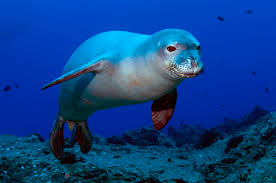Two wildlife issues have collided in Hawaii, pitting one group of animal defenders against another in an impassioned debate. The point of contention? Deadly cat poop and the feral felines that produce it.
 Federal researchers believe feces from the legions of stray cats roaming Hawaii is spreading a disease that is killing Hawaiian monk seals, some of the world’s most endangered marine mammals. Some conservationists advocate euthanizing those cats that no one wants, and that has cat lovers up in arms.
Federal researchers believe feces from the legions of stray cats roaming Hawaii is spreading a disease that is killing Hawaiian monk seals, some of the world’s most endangered marine mammals. Some conservationists advocate euthanizing those cats that no one wants, and that has cat lovers up in arms.
“It’s a very difficult, emotional issue,” said state Sen. Mike Gabbard, chairman of a committee that earlier this year heard a proposal to ban the feeding of feral cats on state land. The panel abandoned the bill after an outcry.
“It struck a nerve in our community,” he said.
The problem stems from a parasite common in cats that can cause toxoplasmosis, a disease that has killed at least five female Hawaiian monk seals and three males since 2001, according to the National Oceanic and Atmospheric Administration.
“While eight seals may not sound like a lot of animals, it actually has pretty large ramifications for an endangered population where there’s only about 1,300 seals in existence at this point in time,” said Michelle Barbieri, veterinary medical officer for NOAA’s Hawaiian monk seal research program. Scientists believe monk seals become exposed by ingesting contaminated water or prey.
Stray cats, meanwhile, have no predators in Hawaii and have ballooned in numbers across the state. Some 300,000 feral cats roam Oahu alone, according to marketing research commissioned by the Hawaiian Humane Society in 2015.
